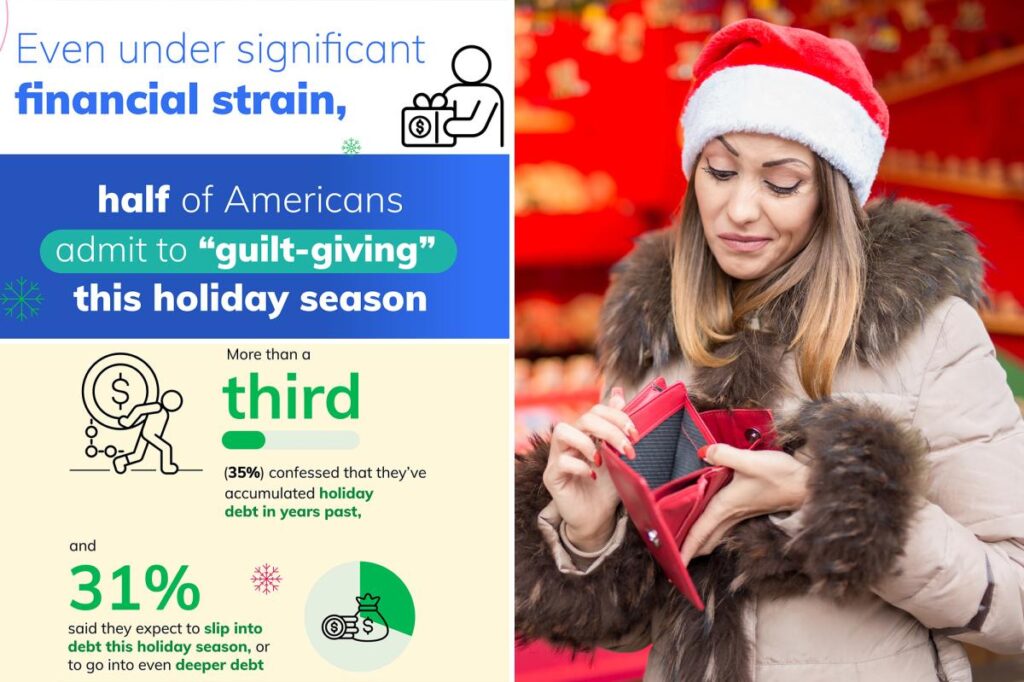Sixty-five percent of Americans say it’s nearly impossible to know how much to “safely” spend this holiday season in a recent survey.
The survey of 2,000 Americans who celebrate winter holidays uncovers Americans’ financial strain, all the pressures they face when it comes to spending on gifts and “putting on” the holidays, and the resulting emotional and financial repercussions.
It’s a very difficult financial year for many, and respondents disclosed they’ve siphoned money from various sources in their lives, saying they haven’t been eating out (25%), putting money in their savings (21%) or even purchasing groceries (19%) in order to put money towards holiday expenses.
Conducted by Talker Research and commissioned by Beyond Finance, the study found that only half of people (51%) have created a holiday budget this season, and of those, most (64%) have already overspent, or anticipate overspending.
And while some are overspending with cash and debit payments (64%), many are putting expenses on their credit cards (54%), pulling from their savings (21%) or using buy-now, pay-later plans (20%).
More than a third of respondents (35%) also confessed that they’ve accumulated holiday debt in years past, and 31% said they expect to slip into debt this holiday season, or to go into even deeper debt.
Adding to the struggle, the majority of people admitted to “guilt-giving” this year: 52% have already bought or anticipate buying at least one gift for a person out of a sense of obligation, rather than a genuine desire to gift them something. On average, people are spending a little over $250 on guilt gifts this season.
Some groups are under more “giving pressure” than others. Young Americans feel more of a burden to give than older generations (Gen Z 64%, millennials 66%, Gen X 50%, baby boomers 38%), and those in relationships are spending more this year out of a sense of obligation compared to those who are single (those in relationships 58%, singles 47%).
Parents and grandparents are feeling the squeeze as well, with more parents of kids under 18 (76%) admitting to guilt-giving than non-parents (44%), and more grandparents (59%) than non-grandparents (45%).
People feel the most obligation to give gifts to their kids (44%), partners (37%), and friends (32%) this year.
But it’s not all negative, as respondents reported feeling a mix of joy (59%), excitement (50%,) and generosity (38%) along with stress (24%) when purchasing gifts for others.
Yet, holiday gifting proves to be a nuanced opportunity, with two-thirds of people (66%) feeling that there’s an unhealthy pressure to buy holiday presents in American culture.
When it comes to uncovering where gift-giving pressure comes from, according to respondents, the most common source of tension is family norms, with respondents citing their family’s strong traditions and expectations for holiday gifts (29%).
Many also said reciprocity pressure and the sense of obligation to give a gift when you receive one (26%) plays a part here as well, along with marketing and things like gift hauls, gift guides and “wish list culture,” which promote the idea that buying gifts equates to caring for others (25%).
“The financial anxiety we’re seeing isn’t just about economic uncertainty; it’s about complex and deeply-rooted emotions,” said Dr. Erika Rasure, chief financial wellness advisor at Beyond Finance. “People feel torn between wanting to create joy and the guilt of knowing they can’t afford it. When cultural norms, family traditions and social media all amplify that pressure, overspending becomes emotional, not rational.”
One in five people (19%) confessed to having bought a holiday gift, trip or experience for a loved one in the past because they wanted to post about it on social media, with Gen Z (36%) and millennials (33%) being the most likely to do this.
And nearly a quarter (22%) revealed they’ve purchased a holiday gift for someone based on trends or recommendations seen on social media, only to regret it later, because while the gift was trendy, it wasn’t ultimately meaningful or of value.
All this tension and pressure can impact relationships, and in the study, a quarter of those in relationships (24%) said they’ve already hidden, or anticipate hiding, a holiday expense from their partner this year.
The most common ways this happens, according to the findings, are waiting until their partner wasn’t around to buy or receive the item (33%), telling their partner an item was on sale or discounted more than it really was (33%) or using cash so there wouldn’t be a digital trail (32%).
“People don’t set out to overspend during the holidays. They want to connect, to make others happy, to participate,” said Lou Antonelli, chief operating officer at Beyond Finance. “But that generosity often turns into guilt and regret. We believe financial and emotional wellness can go hand in hand, and empower consumers to make choices rooted in peace, not pressure, so the holidays can be about meaning — not money.”
Research methodology:
Talker Research surveyed 2,000 Americans who will celebrate a winter holiday in 2025 and who have access to the internet; the survey was commissioned by Beyond Finance and administered and conducted online by Talker Research between Oct. 14 and Oct. 24, 2025. A link to the questionnaire can be found here.
Read the full article here
